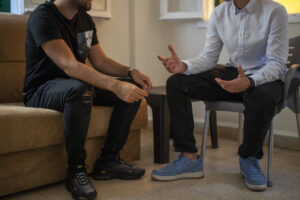To attend the session on this subject go to https://emdc.online/list
or if you miss the session, the video of the emdc online session may be found here https://emdc.online/archive/687

Unaddressed trauma creates barriers to hearing, understanding, and accepting the love of God. In other words, trauma can keep someone from truly hearing the gospel and creates barriers to spiritual growth. If we are concerned with sharing the gospel and planting healthy and reproducing churches, we must pay significant attention to trauma. We must equip and empower lay people with the basic tools they need to address trauma safely, responsibly, and effectively. As lay people learn to use these tools, healing multiplies alongside the Good News.
Healing cannot take place in 7 or 10 simple sessions – it is an on-going journey. From entry into a community to leadership development, it is important to help communities establish environments where healing community, faith, and purpose can flourish. Comprehensive frameworks that integrate a trauma-informed approach into church planting strategy provide structures that allow for lay people to be trained and for healing to happen over time appropriately, in a healthy way, and in a way that multiplies. A trauma-informed approach should take the following steps:
- Begin by appropriately entering a community.
- Move forward by sharing the healing Good News of Jesus.
- Address trauma in healing groups.
- Provide on-going and trauma-informed discipleship.
- Gather participants into emotionally healthy groups that could seed healthy church plants.
- Develop leaders who have experienced trauma healing for themselves and can then lead well and equip their own communities with trauma healing tools.
Experiential learning and storytelling help people internalize and share God’s redemptive stories. People who have survived traumatic experiences, whether literate or not, respond more effectively to an oral environment than a text-based one. This allows participants to learn how to take part in God’s overarching redemptive story and pass that on to others. Multiplication is a biblical pattern. God, the source of immeasurable comfort, comforts us so that we can comfort others who are suffering.
In one refugee community in the Middle East, we’ve seen how oral Multiplying Hope trauma healing groups have taken root in the community. About 80 women participate in on-going groups. Recently, one woman in the community experienced a tragic family loss in her home country. As this woman grieved, the community of women grieved with her. Some of the women have been learning how to listen to each other. One of the leaders said, “I wish I could fix her grief for her. Before, I’d be worried about what to say to her. Now I know that just being with her and listening to her is helpful. I also know that I shouldn’t always talk about my problems to her right now.” Another woman in the community is known as someone who talks about her own problems, rather than listen to others. When she heard this leader say that, she realized what she had been doing and asked forgiveness. The other women readily forgave her. After nine months of consistent, listening community centered on God’s Word, these women are beginning to understand how to walk alongside each other. When the next tragedy happens, they will have a listening community around them to walk alongside them.
Comprehensive, long-term trauma-informed strategies are needed. They take work. They take patience. They take us caring about people to the point that we’re willing to walk alongside them even when it’s hard.
Tricia Stringer Director, Multiplying Hope